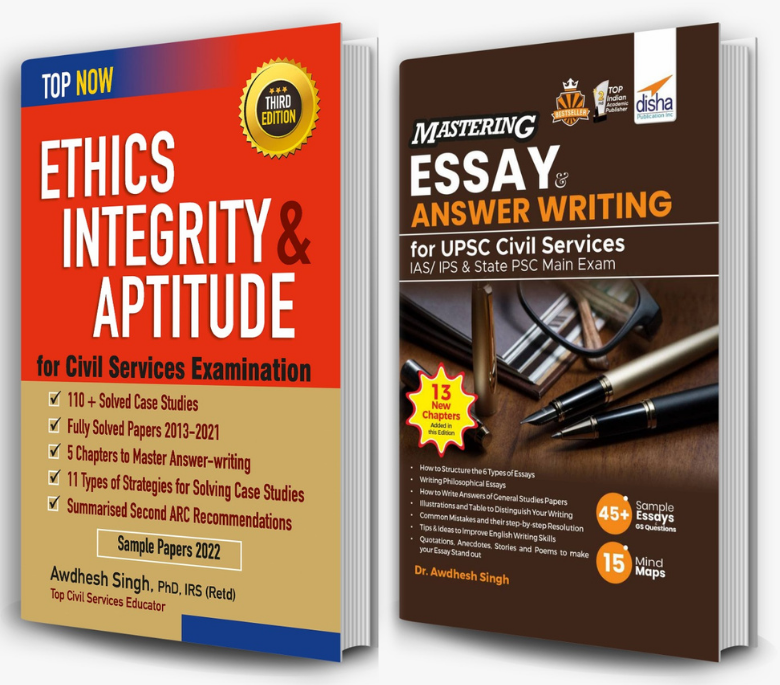Solved Ethics Papers
Topics
All
Civil Services in India (26)
Ethics, Integrity and Aptitude
» Chapters from Book (11)
» Case Studies (8)
Solved Ethics Papers
» CSE - 2013 (18)
» CSE - 2014 (19)
» CSE - 2015 (17)
» CSE - 2016 (18)
» CSE - 2017 (19)
» CSE - 2018 (19)
» CSE - 2019 (19)
» CSE - 2020 (19)
» CSE - 2021 (19)
» CSE -2022 (17)
» CSE-2023 (17)
Essay and Answer Writing
» Quotes (34)
» Moral Stories (18)
» Anecdotes (11)
» Beautiful Poems (10)
» Chapters from Book (5)
» UPSC Essays (40)
» Model Essays (38)
» Research and Studies (4)
Economics (NCERT) Notes
» Class IX (14)
» Class X (16)
» Class XI (55)
» Class XII (53)
Economics Current (51)
International Affairs (20)
Polity and Governance (61)
Misc (77)
Select Topic »

Civil Services in India (26)
Ethics, Integrity and Aptitude (-)
» Chapters from Book (11)
» Case Studies (8)
Solved Ethics Papers (-)
» CSE - 2013 (18)
» CSE - 2014 (19)
» CSE - 2015 (17)
» CSE - 2016 (18)
» CSE - 2017 (19)
» CSE - 2018 (19)
» CSE - 2019 (19)
» CSE - 2020 (19)
» CSE - 2021 (19)
» CSE -2022 (17)
» CSE-2023 (17)
Essay and Answer Writing (-)
» Quotes (34)
» Moral Stories (18)
» Anecdotes (11)
» Beautiful Poems (10)
» Chapters from Book (5)
» UPSC Essays (40)
» Model Essays (38)
» Research and Studies (4)
Economics (NCERT) Notes (-)
» Class IX (14)
» Class X (16)
» Class XI (55)
» Class XII (53)
Economics Current (51)
International Affairs (20)
Polity and Governance (61)
Misc (77)

Q10. Politicization of Bureaucracy
Q10. In a modern democratic polity, there is a concept of the political executive and permanent executive. Elected people’s representatives form the political executive and bureaucracy forms the permanent executive. Ministers frame policy decisions and bureaucrats execute these. In the initial decades after independence, the relationship between the permanent executives and the political executives were characterized by mutual understanding, respect and cooperation, without encroaching upon each other’s domain.
However, in subsequent decades, the situation has changed. There are instances of the political executive insisting upon the permanent executives to follow its agenda. Respect for an appreciation of upright bureaucrats has declined. There is an increasing tendency among the political executives to get involved in routine administrative matters such as transfers, posting etc. Under this scenario, there is a definitive trend towards ‘politicization of bureaucracy’. The rising materialism and acquisitiveness in social life has also adversely impacted upon the ethical values of both the permanent executive and the political executive.
What are the consequences of this ‘politicization of bureaucracy’? Discuss. (250 words) (20 marks)
Answer
The government in a democracy consists of political executives like the ministers and the permanent executives like the civil servants. The political executives are the administrative head of the ministry with the power of superintendence and administration of the bureaucracy. They are also responsible for making laws, rules and procedures through the parliament and the ministries. The permanent executives are responsible for the implementation of the laws made by the parliament and state legislators. They are expected to work independently in their respective domains.
However, the political executives control the bureaucrats as they have the power to transfer them without assigning any reasons. Civil servants often face harassment if they don’t heed the direction of the politicians. Frequent transfers may affect their personal life and cause huge inconvenience to the civil servant. They may also be removed or compulsorily retired from service.
Hence, many civil servants prefer to align with the political masters to safeguard their personal and professional interest, which leads to politicization of bureaucracy. However, politicization of bureaucracy has serious consequences for any nation.
Politicians often engage in divide and rule policy to get more votes and act in a partisan manner to please their vote bank. They also protect unscrupulous businessmen who provide them financial support.
Civil servants can provide fair administration and implement the law impartially because their job is protected by the law and the Constitution. They must discharge their functions impartially. If civil services are politicized, officers would not be taking decisions in accordance with the law, but follow their political masters. Soon citizens may lose faith in the government leading to lawlessness and anarchy in the country. (274 words)

Looking for a One-stop Solution to prepare for ‘Ethics, Integrity, and Aptitude’ and ‘Essay and Answer Writing’ for UPSC?
Ethics, Integrity & Aptitude for Civil Services Examination
Amazon - https://amzn.to/3s1Qz7v
Flipkart - https://bit.ly/358N2uY
Mastering Essay & Answer Writing for UPSC Civil Services
Amazon - https://amzn.to/3JELE2h
Flipkart - https://bit.ly/3gVIwmv
Buy Dr. Awdhesh Singh’s books from the links below-
Ethics, Integrity & Aptitude for Civil Services Examination
Amazon - https://amzn.to/3s1Qz7v
Flipkart - https://bit.ly/358N2uY
Mastering Essay & Answer Writing for UPSC Civil Services
Amazon - https://amzn.to/3JELE2h
Flipkart - https://bit.ly/3gVIwmv
| Related Articles |
| Recent Articles |
